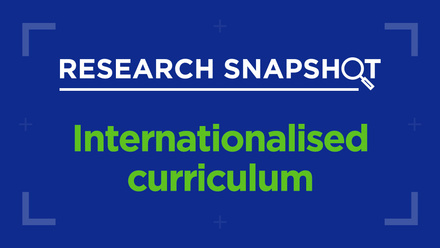Bringing global perspectives to leadership in business

Global business leaders are often presented with unique problems to solve, demanding challenges to overcome, and exciting opportunities to pursue. They are considered to be some of the most valuable and resourceful employees and team members within an organisation. But what makes a strong global leader, and how can international experiences help them prepare for this success?
One key component is early access to and involvement in global opportunities in higher education. As a result of recent research conducted at Drexel University in the USA, we know that early exposure to business ideas and challenges at a global level can be a catalyst for students to start honing their global leadership competencies at the outset of their university careers.
Global classrooms
Global Classrooms (GCs), as we refer to them at LeBow College of Business at Drexel University, allow first-year students to partner with universities from around the world on a variety of business-oriented and globally themed projects. GCs are self-selected, honours-level courses designed for first-year, globally-minded students pursuing new challenges. Additionally, partner university courses are comprised of upper-class students, exposing both cohorts to peers with different levels of experience in learning and leadership. The faculty also integrate and adapt their teaching for a broader audience to learn from each other.
Only 10% of employees begin corporate leadership training before the age of 30
While the course administrators have seen the academic and cultural growth among students in the classroom, as well as evidence of lasting impacts, there was incentive to further investigate how GC alumni perceived their global experiences as it contributed to their successes after graduation as employees, team members or graduate students. In order to achieve this, we set up small focus groups and spoke with five graduates who had participated in a GC their first year. They reflected on their past global immersion experiences and activities while at LeBow College. We compared their responses to Zenger and Folkman’s Global Leadership Development guide, which breaks down key competencies to being a global leader, which include strategic perspective, customer focus and understanding, spotting trends, engaging in teams, willingness to take risks, and knowledge and expertise.
We have found that, through robust engagement and a progressive curriculum, Global Classrooms further students’ development in all six areas evidenced in Zenger and Folkman. We note the greatest growth in three of them, which are expanded upon below.
Engaging teams
A key component of global leadership centres around team collaboration. Students from the GC found themselves paired with colleagues over 2000 miles away, having to work through time differences, language barriers, and the difficulties of technology.
Tatiana F., now an MBA student, believes that the GC helped prepare her for future international endeavours and challenges: "Learning how 3:00pm in the United States meant something very different to those in Europe, or levelling the delicate balance of trust amongst newly-formed teams, was a huge learning curve." Tatiana found that in addition to the hands-on experience, the implementation of strategic curriculum also supported her and her colleagues through the team development phase. With the use of the Enneagram Five Lens Tool, students are able to explore their personal strengths and recognise their areas of development alongside their teammates. Additionally, students apply learnings through global research, directly benefitting from their GC experiences. All student work is showcased at Drexel’s Global Conference on Global Challenges. In these multicultural team projects, students learn the importance of collaboration for successful outcomes.
Willingness to take risks
In GCs, students are encouraged to think outside of the box, adapt quickly to market demands, and work synchronously with team members in the process. Students make challenging decisions, taking calculated risks within the framework of the course.
Not capitalising on unrealised potential is a real threat in business. Our respondents suggested that they were more prepared because of their GC experience to work with others and utilise expertise and skills amongst their team members, oftentimes resulting in calculated and successful risks being taken.
GC-alumnus Nika C., now an account manager at Amazon, remarked, "There is an element of ownership that students in the GC have: to make the best presentation and company decisions of course, but also to be forward-thinking and diverse in their recommendations".
Knowledge and expertise
Knowledge and expertise play a huge role in GCs and how students utilise them post-graduation. International experiences help train and develop students around the globe, and we found that the early exposure through GCs directly contributes to holistic professional development. It left students with a more comprehensive strategic perspective, the ability to successfully manage and lead diverse teams, the confidence to take risks, and the widening of new skills and expertise.
We also found that reflective learning was a key element in this growth, focusing on a ‘what, so what, and now what?’ model. We geared the classrooms to be deliberate in their approach, leaving students with takeaways and future opportunities for growth. Ruth T., now an analyst at Bank of America, found that this model "helped her prepare and incorporate diverse voices, while building rapport with colleagues around the world".
International virtual exchange can set a foundation for the learning and leadership needed in industries around the world today
As we have outlined here, global experiences have many benefits: personal growth, professional development, and the advancement of soft and hard skills. One of its greatest strengths is the learning of traits that hiring managers are looking for in a global environment. A recent study showed that only 10% of employees begin corporate leadership training before the age of 30. For our students, they are starting this development at age 18. This reinforces how an early start on the aforementioned skills is all the more important in the international business and worldwide technology environments.
Kyle L., a real estate agent in Philadelphia and GC-alumnus, echoed this sentiment:. "There are many opportunities for those with international exposure and experience but being culturally aware and apt are always at the forefront."
The international virtual exchange experience of a Global Classroom sets a foundation for learning and leadership needed in industries around the world today. Providing students with this exposure and development very early in their careers equips them with the toolset for inevitable success in the future.






